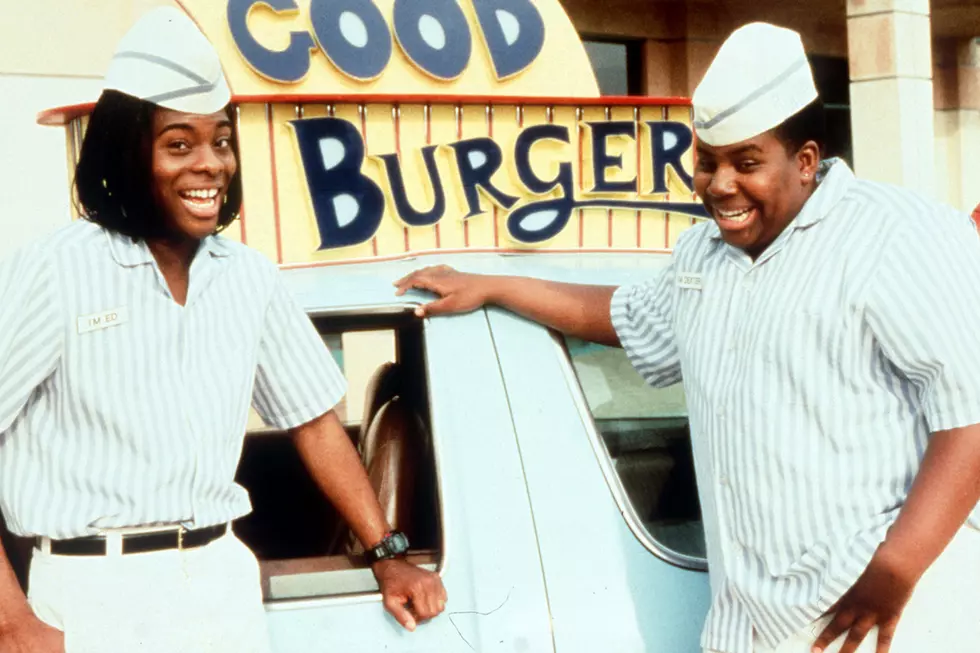
‘The Legend of Korra’ Book 4 Review: “The Calling”
“The Avatar is back in business!”
At the end of this rambling travelogue episode, 'Legend of Korra' puts everything on the table. What is balance? It's compassion, it's bravery, it's endurance, it's understanding, it's fearlessness, it's compromise. It's a state of being that separates revolutionaries from Big Bads. Korra's foes from seasons past weren't actually that bad, Toph tells her new student. Amon wanted equality, Unalaq freed the spirits, and Zaheer fought for freedom. But they crossed a line, tipped out of balance. “They took their ideologies too far,” she says. It's the kind of blunt truth Golda Meir might have whispered. Coming from the blind Earthbender, it's the line of the show.
In “The Calling,” we learn that two things cripple Korra. There's confronting her abilities to take on the dangers of the world, realizing itself in the form of NegaKorra (an apparition that may go unexplained now that she's back in shape). But there's also Korra's loner persona. With society putting so much emphasis on the Avatar's role in the universe, Korra could only look inward towards her own responsibilities. She let her friends and family slip away, lost Team Avatar. How much better would Zaheer's life have been if he just settled down with P'li!? It's all about the ones you love, man.
The lesson is the driving force behind “The Calling,” a joyride deviation into the unexplored sibling triumvirate of Jinora, Ikki, and Meelo. If Book 4 were a plot-driven, Kuvira-vs-Korra face-off, the episode would feel like the show spinning wheels. Book 3 was like one big philosophical-laden chase sequence. “Balance” is even more macro, peering into pockets of the Avatarverse, watching varying world views encounter the same open-ended question, and saying goodbye to the characters we love in the most fleshed out way possible.
Jumping on Pepper the Sky Bison with Tenzin's kids was the fastest way back to warm and fuzzy “Avatar: The Last Airbender” feelings I've had since “Legend of Korra” started. Jinora is like the wiser Katara, Ikki adds a tempered version of Toph's rebelliousness snark, and Meelo is the farty Aang (no one can replace Sokka). Instead of each stop in the search for Korra complicating the overarching political situation (like last week's “The Coronation”), “The Calling” plays character development for comedy. Meelo can draw. Ikki never knew. Jinora is all about her big sister role, protecting her siblings and guiding them with her spirit sense. But Ikki's rambunctious tendencies and go-getter attitude are just as helpful — they only find Korra in the end because the middle-child sticks her nose in trouble.
The episode made room for pure gold a.k.a. everything coming out of Meelo's mouth. “I answer to no man!,” the stomach-turning berries, his introduction to a good-looking lady: “I’m Meelo, what should I call you besides beautiful?” I don't know if it's a purposeful design choice, but it makes perfect sense that Meelo's head would be three-times bigger than what his body should allow. Ikki proves herself a well of comedy too. The entire episode could have taken place inside that Earthbender fort, Ikki demanding macaroons, and it would have been on fire.
Katie Matilla is the family expert of the 'Korra' writing team. Last season, she penned “Old Wounds,” the Su-Lin flashback episode. It's almost frightening how on point the sibling dynamics are in “The Calling.” Full disclosure: I just finished binging “Mad Men” and couldn't shake Kiernan Shipka's Sally Draper from my mind while watching Jinora wrangle her brother and sister. Jinora even looks like Shipka. When the young airbender master barks at Ikki and Meelo as she attempts to meditate, I had flashbacks to the Draper dinner table. That's really just sharp writing and tight voice directing from Andrea Romano, who can make bickering nostalgic. After Meelo dishes out a particularly harsh finger-pointing, Ikki recalls, “Remember when he used to be so sweet?” To which Jinora replies, “No?” Ah, siblings.
Matilla's real feat is incorporating Korra into the entire episode while only giving her a few actual scenes. Bringing Jinora, Ikki, and Meelo back to the sushi restaurant Korra stopped by six months prior is a logical callback for plot purposes. More effective is the random they meet who thought the Avatar was gone for good. “We have one of those?” The Earthbending soldiers that kidnap Ikki — who hint at an imminent attack on Zaofu, yikes! — don't fear word that the Avatar is in close proximity. They'll catch her, deliver her to Kuvira. When Korra returns, it may take her some time to reclaim the honor that comes with her position — a harder fight than any bending battle.
The episode's finale was a delight for “ATLA” fans. As Jinora, Ikki, and Meelo descend into the swapland — in full fart-fighting glory — Korra and Toph take to the Banyan-grove tree, where Aang previously tapped into the connection of the tree to find Appa and Momo. “Feel the roots,” is Toph's only instruction. There is metaphysical spirituality and there is Earthly connection. Toph knows the former, and it's everything Korra needed to reignite. Composer Jeremy Zuckerman strikes up a classic “Last Airbender” cue for the glorious moment. The connection tips off Jinora's spirit sense and, finally, after too long, Korra has a family again.
Korra's self-extraction of the remaining poison isn't as momentous. That feels right. This is about saving the world or tapping into its sprawling potential. Metalbending the final droplets out of her body is about saving herself. Martial arts experts, need your thoughts here, but Korra's process for overcoming fear looks straight out of the T'ai chi ch'uan textbook, serene and strong. Toph is like her soul cycle instructor: “That fight is over. Release the fear.” And that's that, blobs of poison stored in rock for safe keeping.
“The Avatar is back in business!” Depends on your definition of business.
More From ScreenCrush









